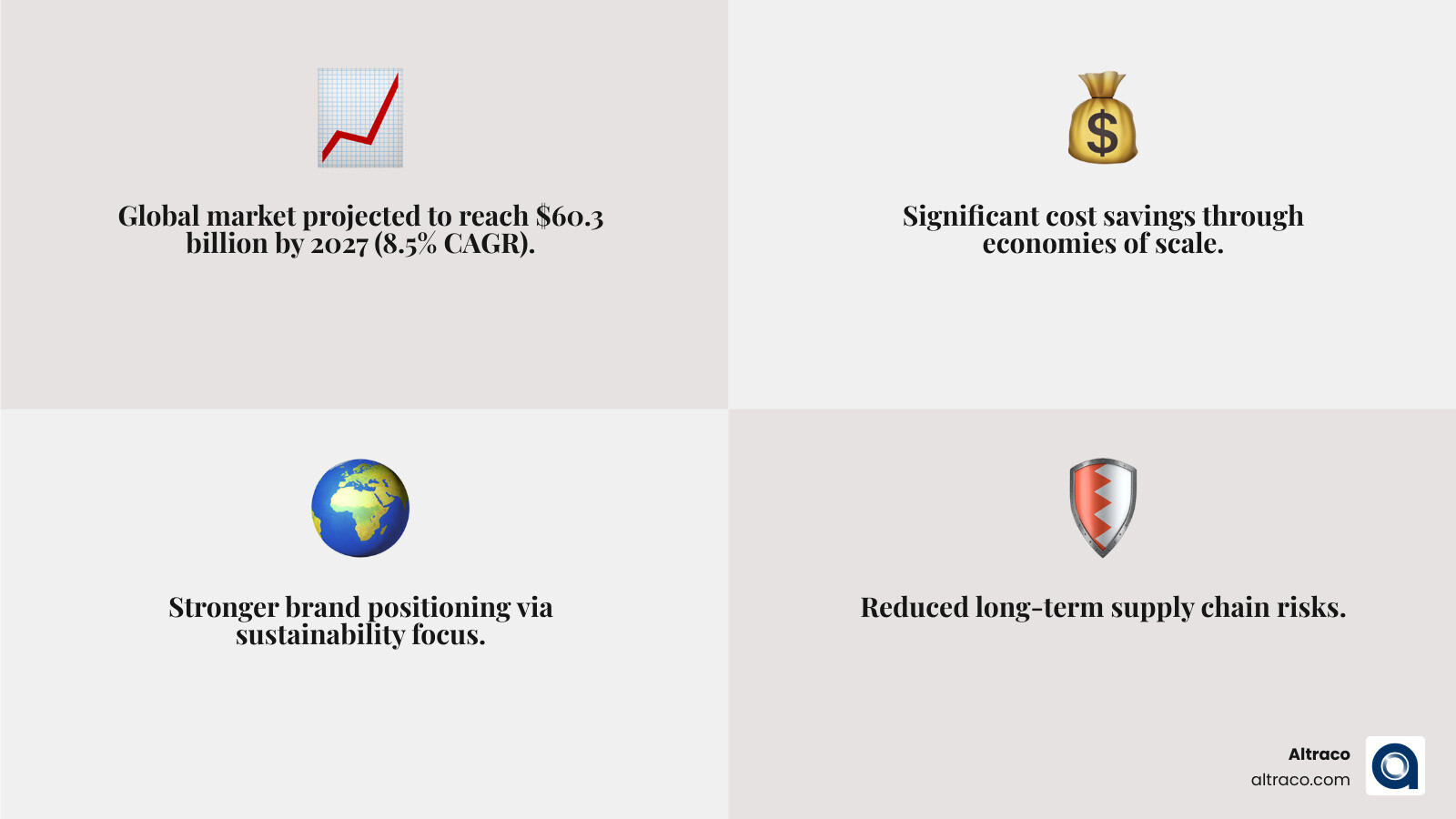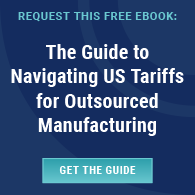Why Bulk Natural Materials Are Changing Modern Manufacturing
The bulk natural ingredients market is projected to reach $60.3 billion by 2027, making it one of the fastest-growing segments in manufacturing. Here’s what you need to know about sourcing these materials:
Key Bulk Natural Categories:
- Natural fibers: Bamboo, cork, hemp for structural applications
- Natural rubbers & waxes: Latex, carnauba wax for seals and coatings
- Natural minerals: Zeolite, bentonite clay for filtration and absorption
- Bio-based resins: Plant-derived alternatives for automotive and outdoor products
Primary Benefits:
- Cost savings through economies of scale
- Improved brand positioning with a sustainability focus
- Reduced regulatory compliance costs
- Access to premium market segments
The shift to bulk natural sourcing is a strategic business decision. It allows companies to command premium pricing, reduce supply chain risks, and gain a competitive advantage driven by consumer demand for transparency. This is especially true in home improvement, sporting goods, automotive, and outdoor products.
However, global sourcing requires expertise in quality control and supplier vetting to maintain consistency and achieve cost benefits. I’m Albert Brenner. With four decades of contract manufacturing experience, I’ve seen how correctly sourced bulk natural materials can transform product lines. My company, Altraco, specializes in building reliable supply chains for these materials in Mexico, China, Vietnam, and other global hubs.

Why Your Business Should Switch to Bulk Natural Materials
For businesses in home improvement, sporting goods, automotive parts, or outdoor products, switching to bulk natural materials is a strategic move that can improve your bottom line. Consumers are actively seeking products made with natural materials and are willing to pay more for them. The global market for natural ingredients is projected to hit $60.3 billion by 2027, growing at 8.5% annually—a fundamental shift in consumer behavior.
Sourcing bulk natural materials correctly delivers cost savings, environmental benefits, and increased consumer appeal. Your carbon footprint shrinks, your brand story becomes more compelling, and you can differentiate yourself in crowded markets. It’s a strategy where sustainability leads to healthier margins and stronger customer loyalty.
The Economic Advantage
A common misconception is that natural equals expensive. When buying in bulk through established supply chains in Mexico, China, and Vietnam, the economics are favorable.
Economies of scale are key. Sourcing large volumes of materials like bamboo or natural rubber through Altraco significantly drops the per-unit cost, enabling better pricing strategies.
Reduced processing costs offer further savings. Many natural materials, like latex rubber or cork, require less energy-intensive processing than synthetic alternatives.
The ability to command premium product pricing is a major advantage. A bamboo-composite automotive panel or a cork-based sporting grip can sell for a significant premium because consumers associate natural materials with quality.
Finally, you gain long-term value. As regulations on synthetics tighten, using natural materials future-proofs your product lines, reducing risks and costly redesigns.
The Environmental & Marketing Edge
The environmental benefits of bulk natural materials create powerful marketing advantages.
Biodegradability is a powerful selling point. Products like cork panels or hemp insulation that break down safely solve a real problem for consumers, unlike synthetics that persist in landfills.
Renewable resources like fast-growing bamboo and regenerating cork bark provide compelling marketing narratives that resonate with consumers.
Natural materials make it easier to meet consumer demand for transparency. Explaining the harvesting of bamboo is more authentic and understandable than detailing complex chemical processes. This transparency builds trust and emotional connections, leading to customer loyalty.
The positive brand story from using natural materials creates powerful differentiation in crowded markets, whether in outdoor gear or automotive components.
Common Types of Bulk Natural Ingredients in Manufacturing
The world of bulk natural materials offers remarkable versatility for home improvement, sporting goods, automotive parts, and outdoor products. These materials often outperform synthetics while telling a compelling sustainability story. Through our partnerships in Mexico, China, and Vietnam, we help companies source the ideal natural material.
Natural Fibers and Woods
These renewable resources bring strength and beauty to modern manufacturing.
Bamboo: This fast-growing grass creates materials stronger than many hardwoods. It’s used in antimicrobial, durable flooring and for its high strength-to-weight ratio in skateboard decks and bicycle frames.
Cork: Harvested without harming the tree, this bulk natural resource regenerates. Its water-resistant, elastic structure is perfect for sporting goods grips, automotive gaskets, and insulation panels.
Hemp fibers: With tensile strength rivaling steel, hemp is ideal for reinforcing composites in automotive parts or creating durable outdoor gear, often replacing fiberglass.
FSC-certified wood: This certification ensures responsible sourcing for lumber used in home improvement or sporting goods. Our factory partners understand and maintain the required documentation.
Natural Rubbers, Waxes, and Resins
These materials offer sustainable alternatives to petroleum-based products.
Natural latex rubber: Sourced from rubber trees, it offers superior elasticity and durability for sporting goods grips, automotive seals, and outdoor gear components.
Carnauba wax: As the hardest natural wax, its high melting point and water resistance make it ideal for protective coatings on automotive finishes and outdoor equipment.
Plant-based resins: These bio-renewable alternatives to plastics can be molded into complex shapes for automotive interiors or sporting goods housings.
Bulk Natural Minerals and Aggregates
These are the unsung heroes of many manufacturing processes.
Zeolite Powder: Formed from volcanic ash, its unique crystalline structure makes it an exceptional filter and absorbent for water filtration and odor control. European research on Zeolites continues to reveal new applications.
Bentonite clay: This bulk natural material offers excellent binding and absorption. It’s used in foundation sealing for home improvement and as a binder in composite sporting goods.
Diatomaceous earth: Consisting of fossilized algae, it provides excellent filtration and mild abrasive properties for natural polishing compounds in automotive care or as an eco-friendly pest deterrent.
How to Source and Vet Suppliers for Bulk Natural Ingredients
Finding reliable suppliers for bulk natural materials is a major challenge, especially when dealing with overseas production for industries like home improvement or automotive parts that demand precision. A strategic approach and the right partner are essential for success.
Finding the Right Supplier
Understanding your sourcing options is the first step.
Direct-from-producer sourcing seems attractive for pricing but requires significant investment in relationship building, logistics, and navigating language barriers.
Wholesale distributors offer convenience and handle logistics but add cost layers and may reduce transparency into the material’s origin.
This is where an experienced Manufacturing Partner California like Altraco adds value. We bridge the gap, offering the cost benefits of direct sourcing with the convenience and expertise of a knowledgeable partner. Our teams in Mexico, China, and Vietnam have spent decades building relationships with trusted factories. We don’t just find suppliers; we vet them for reliability and capacity, ensuring they can scale with your business.
Key Quality and Sustainability Standards
Quality control is critical for bulk natural materials due to their inherent variability. Our approach to Quality Control begins before production.
- Clear product specifications: We establish clear specs that account for natural variations in density, elasticity, or composition while meeting your product’s standards.
- Third-party inspections and factory audits: These are non-negotiable. We conduct on-site inspections to verify production capabilities, quality systems, and working conditions.
- Ethical sourcing practices: We ensure materials are not linked to deforestation or exploitative labor, protecting your brand and meeting regulatory requirements.
- Sustainability certifications: We guide clients through the complex maze of certifications like FSC or Fair Trade.
- Supply chain transparency: We maintain detailed records of material origins and processing, providing the transparency needed for marketing and compliance.
Our expertise in Navigating Overseas Production and applying our Proven Tips to Improve Quality in Overseas Manufacturing is custom for natural materials. This means clear communication, detailed specifications, and strong supplier relationships, giving you the benefits of global sourcing with the quality assurance you need.
Applications and Innovations in Products Using Bulk Natural Materials
The versatility of bulk natural materials sparks genuine innovation across industries. At Altraco, we’ve seen how these materials transform product lines in home improvement, sporting goods, automotive, and outdoor sectors by outperforming synthetics. For example, a bamboo bicycle frame absorbs road vibration better than steel, and a cork yoga mat provides superior, antimicrobial grip compared to synthetic rubber.
Home Improvement & Outdoor Gear
The home improvement industry has acceptd bulk natural materials for their performance and health benefits.
Bamboo flooring has revolutionized the market, offering hardwood-like durability with a lower environmental impact, as bamboo is a rapidly renewable grass.
Cork wall panels provide natural sound dampening and thermal insulation due to cork’s cellular structure, which also makes it resistant to mold.
Natural fiber insulation, such as hemp-based options, not only insulates effectively but also improves air quality by regulating humidity.
For outdoor gear, waterproofing waxes like carnauba create a protective barrier that is both durable and breathable, outperforming many synthetic coatings.
Sporting Goods & Automotive
When natural materials outperform synthetics, it’s a win for the performance-driven sporting goods industry.
Natural rubber equipment grips remain the gold standard in many sports due to their superior elasticity and tactile properties.
Cork-based sporting goods are used in lightweight paddleboard cores and antimicrobial yoga blocks, leveraging cork’s shock-absorbing qualities.
Bio-plastics in car interiors, derived from corn starch or cellulose, match the durability of petroleum-based plastics while reducing off-gassing.
The industrial applications of materials like zeolite powder are also notable. While European research on Zeolites has shown its ability to trap radioactive particles, its powerful absorbent qualities are valuable for automotive air filtration and industrial purification. Success with bulk natural materials requires manufacturers who understand both the materials and their applications. Our decades of experience provide this crucial link for our clients.
Frequently Asked Questions about Sourcing Bulk Natural Ingredients
Companies exploring bulk natural materials often have questions about costs, quality, and practicalities. Here are the most common questions we encounter from clients in the home improvement, sporting goods, automotive parts, and outdoor product sectors.
What’s the difference between ‘natural’ and ‘organic’ in bulk manufacturing?
In manufacturing, this distinction is critical for compliance and cost. ‘Natural’ refers to substances from nature with minimal processing (e.g., shaped bamboo). The term lacks a strict legal definition for all industrial uses, so a ‘natural’ material might still involve conventional pesticides.
‘Organic’ is a regulated term. To be certified organic, a material must meet rigorous standards (e.g., USDA, EU) for its entire supply chain, from growth to handling, which requires third-party verification.
The certification requirements for your end product dictate which path to take. The cost implications are significant; organic materials can be 20-40% more expensive. For many industrial applications, this cost isn’t justified, but for some consumer products, the premium pricing can offset it. The key is transparent marketing claims.
How can I ensure quality when sourcing natural materials from overseas?
Quality control for bulk natural materials requires a systematic approach due to their inherent variability. Our experience across Mexico, China, and Vietnam is invaluable here.
It starts with clear product specifications that define acceptable ranges for moisture, density, and color. Third-party inspections are non-negotiable to get objective data during production and before shipment.
Our factory audits evaluate a supplier’s quality systems, storage, and handling procedures. We apply our Proven Tips to Improve Quality in Overseas Manufacturing to build long-term relationships with suppliers who understand your requirements. This systematic approach, honed through years of managing Overseas Production, ensures consistency.
Are natural materials always more expensive than synthetic alternatives?
Not when you consider the total value. The sticker price may be higher, but the overall equation often favors bulk natural materials.
Consider initial cost versus lifecycle value. A durable natural rubber grip may outlast a synthetic one, extending product life. Economies of scale in bulk purchasing also dramatically lower per-unit costs.
Reduced regulatory costs are another factor, as natural materials often face fewer compliance problems. Most importantly, they enable premium product pricing, as consumers are willing to pay more for sustainable, high-quality products. When we evaluate a switch to bulk natural materials, we look at the complete picture, and the math often works strongly in their favor.
Conclusion
Making the switch to bulk natural materials is a smart business decision that positions your company for long-term success. We’ve seen how materials like bamboo, cork, zeolite, and bentonite clay are changing manufacturing across key industries.
With the natural ingredients market projected to reach $60.3 billion by 2027, companies that adopt bulk natural sourcing now will gain a significant competitive advantage. Your customers want products that deliver performance and a sustainable story.
However, global sourcing is complex. The challenges of quality control, supplier vetting, and logistics can be overwhelming. This is why Altraco exists. For four decades, we’ve simplified the complex.
Our team has deep relationships with trusted factories in Mexico, China, Vietnam, and beyond. We ensure suppliers deliver quality bulk natural materials that meet your exact specifications. When you partner with Altraco, you get more than competitive pricing; you get a team that expertly steers international manufacturing.
The future belongs to companies that can deliver exceptional, sustainable products. Bulk natural materials offer that balance.
Ready to explore the possibilities? Explore our white label and contract manufacturing solutions and let’s discuss how we can harness the power of natural materials for your next project.





